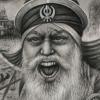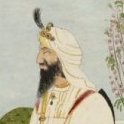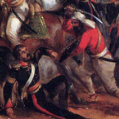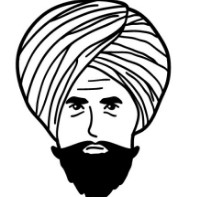Leaderboard
Popular Content
Showing content with the highest reputation on 03/05/2021 in Posts
-
Right bro. Baby in tow? Women are incredible.6 points
-
Vaheguru ji ka khalsa Vaheguru ji ki fateh Hanji veerji.There was a Mahapurakh in a nearby country, in Malaysia.He gave alot of Bachans and all of them came true.He said that in the future everything will go back to how it was during Puratan times. Bhul Chuk Maf ?4 points
-
I just wanted to point out that person walking behind holding a palla control the person walking in front. just like how you can control an animal( horse). If you don't like the current Anand karaj maryada than please go ahead and get a court marriage.4 points
-
I still like koi's argument about orbital distance. Infact, the outer partner will have to increase speed while covering a larger distance to maintain equal timing upon arrival at the starting point.3 points
-
From my understanding some creatures are aware of God more than others are. Japji sahib says a man with a lot of influence and power is nothing in comparison to an ant who does not forget God. There is a story of an elephant named Gajraj I believe. While drinking water a crocodile came and bit the elephants trunk and wouldn't let go. The elephant then remembered God and then Vishnu appeared and saved the elephant. Guru Gobind Singh ji also used to have a white elephant in his darbar! the elephant used to do chaur sahib over Guru Ji! Everyone knows about Guru jis Blue horse and White falcon but no one ever talks about the elephant lol. I think the elephant even had a name? Some animals are a lot more intelligent and emotional than we think. Elephants travel using the same route that the elephant family have been using for generations when travelling miles and miles looking for water during droughts. When they pass a spot where an elephant from the family had died years ago, they actually stop and stand there for some time before continuing their journey. Wildlife biologists are still trying to fully understand why elephants do this and other behavior.2 points
-
Only person I've heard use a more contrarian tone is Sant Gyani Gurbachan Singh Ji. They mention the Quran being stolen letters that Muhammed appropriated by murdering the author. They also mention the origins of some Islamic customs as being not so divine. I don’t know what sources they would be using in that era, it would be interesting to find out. I think one factor why our parchariks aren’t critical of Islam is lack of actual research and available material. I doubt Gyanis have access to the kind of material Christian theologians have. Other than that, post-47 we don’t see Islam as our main threat. Nevertheless, the older generation continue to harbor mistrust of Muslim. It’s just the generation post-47 that grew up with a romanticised version of Islam, started displaying “enemy of the enemy is a friend” attitude.2 points
-
2 points
-
... while actual Islamic teachings and scriptures (The Sunnah, the Quran and the Hadiths) make no attempt to conceal the frankly questionable feats, bachans, and moments of his life? Rampant sexual degeneracy, idolatry, hypocritical religious edicts and conduct, and unexplainably savage and bloodthirsty barbarism across the board. Yet, Sikh sants, gianis, and parcharaks speak so effusively and warmly of "Mohammed Sahib" and his various companions and successors. These Sikh personalities can barely conceal their admiration for the Islamic prophet and his achievements. What's going on?1 point
-
It was the Nicean Council that apparently put paid to the esoteric, mystical teachings of Jesus and the early Christian founders. Apparently, it was well known back in the day that Jesus travelled to Tibet and spent his 20s with yogis of that area, which is where he did vichaar about reincarnation. That brand of Christianity may possibly have been the purest form of Sufism. The Nicean Council also supposedly removed and censored the Gospel of Judas which was rediscovered in the 1970s. I'd recommend a read of that if anyone is interested. It's absolutely fascinating, and if it's true it explains quite a lot about the corruption of original Christianity by its own clergy. In short, Judas was the only disciple who understood that Jesus was from (to all intents and purposes) Sachkhand, and in this Gospel Jesus admonished the disciples for worshipping a pakhandi "God" who was nothing like the ultimate creator whom he described as being closer to the formless force that we're familiar with. It could be a load of tosh, but reading it with "Eastern" eyes it's understandable why it may have been removed if true. CORRECTION: It was the Second Synod of Constantinople that passed the decree against reincarnation, headed by the emperor Justinian.1 point
-
I think this happened post annexation. Original rehats and stuff don't really have any rose tinted views of what they considered malech. I remember one Suraj Prakash extract I translated too, would be considered unacceptably unPC today:1 point
-
Its interesting how some of the earliest versions of many religions were very mystical. Early Christians like the Desert Fathers would go into the deserts and write mystical writings and prayers. But these writings were considered "corrupt" and were not included with the 4 Gospels. These early Christians were later considered heretical Judaism have the Kabbalah, its Jewish mysticism and includes things like reincarnation. Islam developed Sufism, which from a Sikh point of view is far more closer to the truth, but Sufis have been persecuted for centuries. Some of the earliest Christians writings, which were later considered heretical.1 point
-
Matt. 11:14 “And if you are willing to accept it, John himself is Elijah who was to come. Bible suggests that John the Baptist was the reincarnation of prophet Elijah. Early Christians believed this though modern Christians don't.1 point
-
I think a lot of the teachings of these prophets have been distorted to an extent which is why I think it was great foresight on the Gurus part to create literature and approve literature along with of course compiling Sri Guru Granth Sahib, that way, there would be less distortion of the messages...1 point
-
I've also heard that there was mention of reincarnation in early Christian culture but it was discarded in Roman times...1 point
-
It's shortsighted tomfoolery. It leaves Sikhs prone to Islamic dawah that cannot be countered by non-scholars. If it is politically motivated, then is lying in sangat excusable as long as it's in service of a flimsy greater good? How about those countries where it's not the Hindus who are undermining and targeting Sikhs for elimination or conversion but it's Muslims or Christians? This is what happens when you leave religious and spiritual edification to an unaccountable, elite priest class. If we took the time and effort to at least educate ourselves in the basics, nobody could fool us, even so-called benevolent allies.1 point
-
I watched the earlier videos last year, the ones about satanic child abuse. I don't know what to make of this issue, tbh. It seems like nothing is ever really done about these things. The victims end up dying before their time as a result of the trauma they faced, developing illnesses and other issues as they become figures of ridicule or mistrust. The perpetrators are protected and free to live their lives. There's no justice in that.1 point
-
If you read Dasmesh Pita ji's writings it is clear that he is not impressed by the actions or lack of preachings of Mohammed . At a point he mentions that the way it is practised it is the faith of shaitaans1 point
-
^^ It would be a travesty if in fact no one from the previous era had bothered to understand ALL Islamic scriptures including the Quran and Hadiths in original source. I hope they weren't simply reading sanitized commentaries and translations all this time. Other than that, hindu dieties/customs were a softer target (prior to the current aggressive hindutva resurgence). It's more appealing to point out flaws in docile hindus than engage in constructive self analysis.1 point
-
Lmao, reverse psychology, good idea. Convince her the husband is a mule or livestock to be reined by the bride; a metaphor for marriage. ?? Debate over. Not only is Sikhi pro-female, the Sikh marriage ceremony demotes the groom to animal status.1 point
-
Wonderful replies here by the sangat ??. A small point to note; if you walk side by side, one of you will stand closer to the Guru and have to walk a slightly shorter distance, while the other will have to stand a little further away from the Guru and walk a slightly longer distance. Who will it be? And how do you decide who gets to stand closer to the Guru? This is what happens when you start splitting hairs. As sangat have mentioned, if you don't like the Anand Karaj, you are more than welcome to get "married" in any other way you see fit...1 point
-
You learn that the hard way. Including so-called 'family'. Biggest betrayals disappointments comes from those you thought are your 'friends + family'.1 point
-
BTW (in a house, own room) listening and trying to understand fully Sidh Gosht, I am so thankful to and for Waheguru1 point
-
1 point
-
I've said this before. Sikhi did a lot in civilising Indians. The Hindu and Muslim attitude towards rape is barbaric.1 point
-
Totally ridiculous thread. My suggestion would be to get married in a church or court marriage. Skip Anand Karaj if not too keen of our pious traditions.1 point
-
I really am making a conscious effort to adjust my frame of mind so that I'm not viewing reality from a purely masculine and patriarchal perspective, but reading 5hit like this hammers home the absolute futility of it all. We know what she's going to come back with: "Sikhi is outdated / sexist / patriarchal / anti-female" and we're all pendu b**tards who wants to ruin her special day.1 point
-
You're marrying the love of your life (supposedly), and you're more worried about whether if you're walking behind, beside or in front of him. Rather than booking the nearest wedding date available in great anticipation, to get married to person you love, you're delaying the process because of your insecurities. I suggest you go back to basics and ask yourself, what does this person mean to you? why are you marrying him? and why Anand Karaj? and what is your priority in this relationship? Its not too late to reconsider, modern Sikh marriages suggest that marriage isn't for everyone. As for why the bride walks behind the groom, then that is because your father will pass your husbands pala into your hands. This symbolises that your father is now passing you onto your husband and that you are now a part of your husbands family. The grooms father does not pass the brides chunni into the grooms hand, it is the brides father that passes the grooms pala into his daughters hand. Your sons will also be a part of your husbands family and take their fathers name. Just how Guru Gobind Singh ji narrates the history of his family, the Sodhi clan, the clan of his father Guru Tegh Bahadur Ji. Just how Guru Nanak Dev ji is described as being born into the Bedi clan, the clan of his father Mehta Kalu. Just how Bhai Santokh Singh ji describes that when Guru Nanak Dev ji is born the BEDI ladies(aunts) come around to see Baby Guru Nanak. Guru Gobind Singh ji's hukkam is that a Sikh man should get his daughter married into a house where Sikhi is practiced, why ? because its the bride that is marrying into the grooms family, hence a father should choose a home for his daughter where Sikhi is practiced. Just like that the father of the bride passes the grooms pala into the brides hand, symbolising that she is now a part of the grooms family and their kids will also be part of the grooms family. We have been getting married like that for centuries, its our tradition. If you don't like it, then like others have suggested you can have a registry marriage. @jkvlondon would you like to give this bibi some advise?1 point













